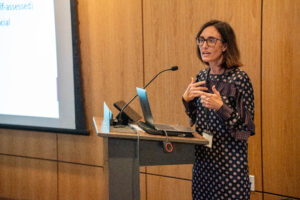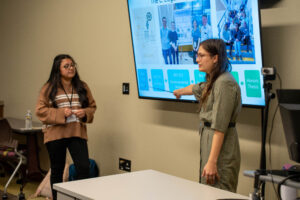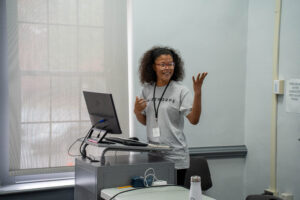On Friday, November 10, Oglethorpe University’s Diversity, Equity, and Inclusion Task Force hosted the inaugural “Supporting First Generation Students in Higher Education Conference.” At the conference, professors, student support practitioners and advocacy groups learned from student experiences and shared innovations to remove the veils affecting student success.
Oglethorpe’s Interim Provost Dr. Kendra King Momon welcomed attendees in the opening plenary, followed by a student and alumni panel. A video produced by alumni James Williams ’23 and ideated by students Gloria Okwueze ’25 and Ivy Nganga ’25 highlighted what Momon describes as the resilience, resourcefulness and revolutionary character of first-generation students.
Throughout the day-long event, panels and workshop presentations emphasized the essential role of every party in the student’s education team. From considering holistic care work and mental health to advocating for immigration policies, session leaders acknowledged that academic performance for admitted students is largely affected by life circumstances, rather than aptitude.

Dr. Rachel Gable delivering the keynote at the Supporting First-Generation Student in Higher Education conference
In the keynote address, Dr. Rachel Gable, author of “The Hidden Curriculum: First Generation Students at Legacy Universities,” highlighted differences amongst first and continuing generation students’ perceptions of college preparation and proven actions for supporting students to foster belonging and achievement.
For example, first-generation students were more likely to assess their early grades as being a part of their belonging. When they had low grades, they equated that with not belonging in school. For students who were top in their high school, “even an A- or B+ can get them thinking they don’t belong,” Gable said.
For some, these experiences of imposter syndrome can lead to a downward spiral that is tough to dig their way out of. But once educators understand the students’ perception of grading, we can consider ways to teach students how to evaluate their grades.
“All of the things you think of as normal and expect everyone to understand as normal in an academic context serve to exclude or include,” Gable added.
In an interview, Kaniya Freeman ’25, a first-generation student at Oglethorpe and presenter at the conference, explained, “it’s the rules of academia, the expectations and understanding that growth is not linear” that becomes most necessary for first-generation students.
But unfortunately, there are stigmas around first-generation students that can stifle innovation and change. As Dr. Rebecca Sandidge, vice president for Enrollment Management at Oglethorpe, expressed in an interview, “stigmas around first-generation students include the implicit bias that they are not ready for higher education.”
The information coming out of this conference dispels all of that and requires educational institutions to make a shift.

Students Mackenzie Roberson ’24 and Jaely Chavez ’24 present at the first-generation conference
Session leaders considered multiple strategies that focus on making these hidden rules visible. Oglethorpe Professor of Biology Dr. Karen Schmeichel and students Mackenzie Roberson ’24 and Jaely Chavez ’24 highlighted the Pipeline CURE program, a collaboration between development biologists from Oglethorpe and Emory that gives first-generation students access to state-of-the-art research and mentorship.
Oglethorpe office of Student Success and leaders of the First-Year Seminar program discussed the significance of mentoring networks to fight invisibility and facilitate connections amongst students and their peers with the hopes of making those hidden expectations of academia known early.
The Role of Institutions
“Higher education is a gateway to economic opportunity” explained Momon.
Even first-generation students recognize “the transformative power of academics,” according to Gable. While continuing-generation students see extracurriculars as far more important, first-generation students acknowledge the identity shift and opportunities academia offers.
And they are saying “yes” to that opportunity. Opportunity Insights data collected by Gable revealed that amongst some of the higher education institutions that were represented at the conference, Brenau University had the highest percentage of first-generation students at 60%, followed by Oglethorpe at 52% (self-reported), Agnes Scott at 25%, Emory at 10%, and University of Georgia at 8%. With a comparatively significant first-generation student population, Oglethorpe can be a valuable contributor to innovations in teaching and learning that support all students.
Institutions use different means to determine their first-generation student population. For Oglethorpe, the first-time full-time, first-generation student enrollment was 52.2% of the class entering in fall 2023, compared to 37.2% of the class that started in fall 2022. Considering the unique identity of this population, a focus on improving student success here can have a significant impact on the entire campus.
Policy Implications
This isn’t the first time we’ve talked about first-generation students, but in our current higher-education landscape, this focus is essential both to pushing innovation in universities and promoting a healthy, diverse society.
In the summer of 2023, the Supreme Court gutted affirmative action and race-conscious admissions policies. One response has been to increase efforts to recruit and serve first-generation students. For some institutions like Oglethorpe, that just means understanding the understudied first-generation population that already exists.
First-generation students come from all races, ethnicity and gender backgrounds, providing a space to both consider the unique experiences of different segments and the common wants and needs that affect the whole.
As Gable explained, first-generation students “are more likely than their continuing-generation peers to be females, students of color, public high school graduates, military, veteran, or dependents of service members, immigrants/first-gen Americans, lower socio-economic status / Pell Grant eligible, and caregivers.”
Dr. Reena Viswanath, professor at University of West Georgia, explained the necessity of critically reviewing how we define “first-generation college student.”
Uncovering strategies to assist first-generation students can also impact some of the Undocumented and DACA student populations. Oglethorpe is known for its continued support of Undocumented and DACA students. Organizations including U-Lead and FWD.us, nonprofits that serve immigrant families and advocacy, expressed during the conference that it’s vital to advocate for policy changes, such as a license to drive or work authorizations for DACA/Undocumented students, in order to improve their success.
Next Steps
The simplest step educators can take to improving support for first-generation students is asking the question, “what are the informal rules, assumptions, and expectations I have of the students I work with?” After considering the answers, educators can begin to develop ideas for communicating or, in many cases, eliminating these hidden rules. This new lens needs to be implemented throughout the pipeline from high school to undergrad to post-graduation.

Kaniya Freeman ’25 presents at the First-Generation Conference
After experiencing feelings of estrangement in the classroom, student Kaniya Freeman connected with OU’s Assistant Director of First-Generation Student Support Jessica Winestock. She remembers Winestock helped her to understand that the only thing that separates her from continuing generation students is exposure. This experience of care has helped Kaniya overcome imposter syndrome.
“Just as much as it’s the teacher’s job to expose the class, it’s the student’s job to want to expose themselves and the available resources,” Kaniya explained.
To those ends, Oglethorpe offers a hybrid approach to make that exposure available. It includes what Gable calls a “one-stop shop” where first-generation students connect with Winestock, as well as a “decentralized” strategy where students find additional tutoring, mentoring, counseling, academic and community support in other areas on campus open to all students. This mixed response offers an experience that both provides inclusion and deters from encouraging assimilation as the only means for success in higher education.
Kaniya’s experience and the theme of presentations throughout the conference showed the significance of collaboration between faculty, student support, and students in order to improve student success. It also recognized the necessity of strengthening the pipeline between high school, college, and post-graduation opportunities. Those interested in funding student success can partner with faculty, staff, and advocacy groups to provide necessary resources to spur innovation.
Overall, it was clear that it is the role of the institution to be responsible for student success. In an interview Dr. Rebecca Sandidge, VP of Enrollment emphasized, “It is part of our mission to provide access to as many qualified students as possible to a quality liberal arts education.”
I would like to thank the conference committee, a collaboration of faculty and staff, for their vital efforts in orchestrating this conference and advocating for our students. The committee includes Marisol Zacarias, Tim Piper, James Iredell, Peter Dye, Valeri Cruz, Susan Noh, Grant Utter, Phoebe Rushan and Autumn Johnson.
Dr. Rhana Gittens Wheeler was recently named Special Advisor to the President for Diversity, Equity and Inclusion at Oglethorpe University. In addition to this role on the university’s Senior Administrative Leadership Team, Dr. Gittens Wheeler is an assistant professor of Communication Studies, Director of the Rich Urban Leadership Program and Program Coordinator for African American Studies.
